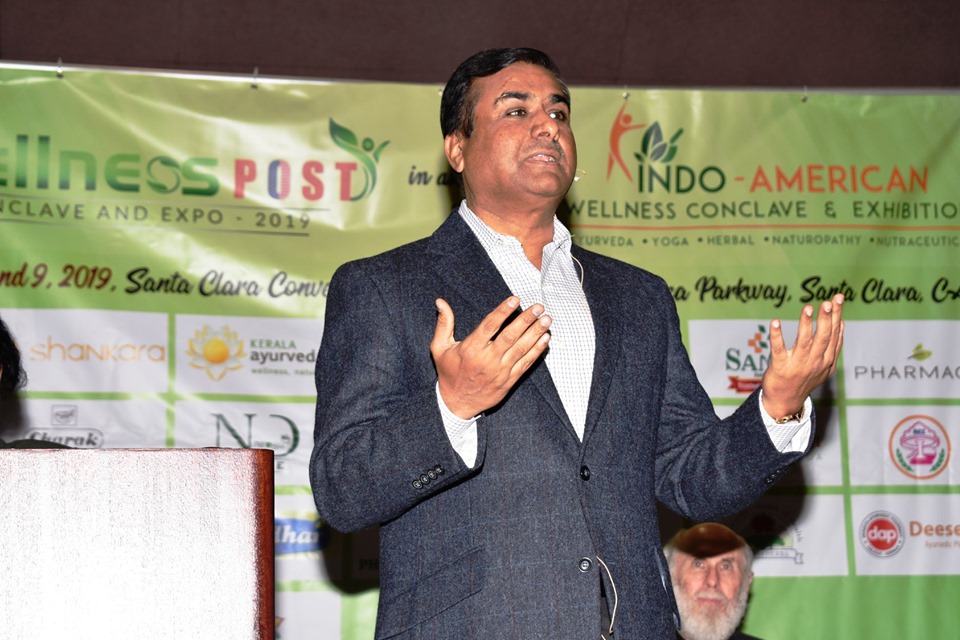Lakshmi Iyer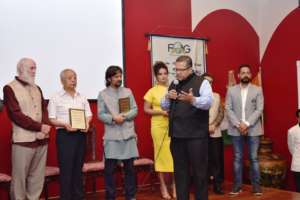
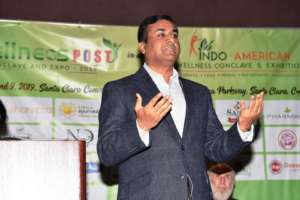
India Post News Service
SANTA CLARA, California: Wellness Post Conclave and Expo 2019 was held June 7-9 at the Santa Clara Convention Center.
On June 8, the second day, the opening panel of the Conclave was the Integrated Management of Obesity, Diabetes, Cholesterol and Hormonal Imbalances (Integrated Approach to Metabolic Disorders).
The panel head/moderator was Dr Vivek Shanbhag, doctor of naturopathic medicine and Ayurveda, and founder of Natural Medicine and Ayurveda clinic. Dr Namyata Pathak, ayurvedic doctor and founder of Dr Nami’s Integrative Clinic, Dr Manisha Kshirsagar, ayurvedic doctor and faculty member at College of Ayurveda, Mount Madonna Institute, and director of Ayurvedic Healing clinic and Gayathri Shanbhag, nutritionist and diet therapist at Natural Medicine and Ayurveda clinic were the other panellists.
Two other panellists joined from India – Dr Shaleen Singh, chairman of Shaleen Pharmaceuticals in Panchkula, Haryana, and Dr Vinayak Dahiwal from the Research and Formulations Division of Charak Pharma. 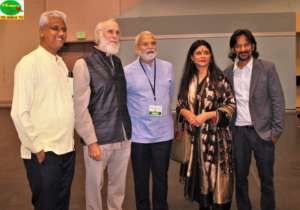
Dr Shaleen Singh spoke on “Diabetic Neuropathy and Associated Complications”. Dr Manisha Kshirsagar spoke on hormonal imbalances especially affecting women whereas Dr Vinayak Dahiwal spoke on hormonal imbalances especially pertaining to female fertility and reproduction.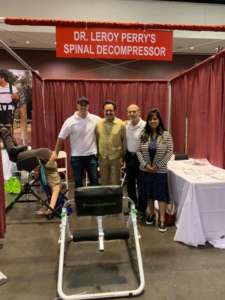
Dr Vivek Shanbhag, Dr Namyata Pathak and Gayathri Shanbhag addressed the issues of metabolic disorders and the role of diet and lifestyle in optimal health maintenance.
The next panel was on the Management of Heart Problems (cardiovascular disorders). Dr David Frawley, also known as Pandit Vamadeva Shastri, opened the panel with his keynote address that touched upon the spiritual significance of the heart and the energy residing there.
Along with Dr. Frawley, the other panelists were Dr Suhas Kshirsagar, program chair, College of Ayurveda, Mount Madonna Institute, and founder of Ayurvedic Healing, Dr RomeshJapra, cardiologist and founder/convener of Festival of Globe (FOG) and Wellness Post, and Publisher, India Post, and Matra Raj, certified yoga therapist (C-IAYT) and board member, International Association of Yoga Therapists (IAYT).
Dr Suhas Kshirsagar led and moderated the panel. In his address, he quoted Dr. David Frawley’s speech, “The root cause of everything is people being disconnected from their own selves.” He explained that cardiometabolic and cardiovascular diseases formed a syndrome – spectrum of disorders that were all interconnected.
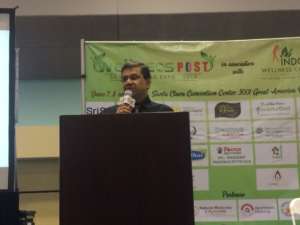 Dr Suhas added that all these lifestyle diseases such as heart disease, diabetes, hypertension, high cholesterol, and arthritis were top killers. Earlier, they used to be categorized in different silos, with patients being referred to a different specialist for lung problems, heart or brain problems.
Dr Suhas added that all these lifestyle diseases such as heart disease, diabetes, hypertension, high cholesterol, and arthritis were top killers. Earlier, they used to be categorized in different silos, with patients being referred to a different specialist for lung problems, heart or brain problems.
“But the new science of functional medicine is totally going back to the same Vedic roots of understanding of looking at the physical structure – mind, body and spirit in total integration,” he said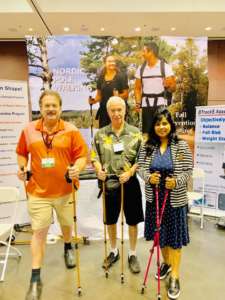
Dr Japra shared his own experiences as a cardiologist with particular reference to his early days at AIIMS in Delhi, India. Those were the days when there were few EKG/ECG machines and interns manually read pulses of patients. He recalled that high ranking ministers in government and rich people typically had heart problems. A stressful lifestyle was a significant factor.
Matra Raj shed light on the usefulness of yoga therapy in the rehabilitation of patients with chronic illness.
The lunch break had a meet-and-greet session with Bollywood actress, Neetu Chandra, who was the Ambassador for Wellness Post 2019 and Indian cyclist and activist, Somen Debnath, who has pedalled across the globe, raising awareness about HIV/AIDS.
The post-lunch session, “Prevention and Management of Auto-Immune Disorders” had an all-women panel, headed by Dr Anupama Kizhakkeveettil, program chair for ayurvedic medicine, Southern California Institute of Health Sciences (SCU). Dr Anupama is also a licensed acupuncturist and a certified yoga therapist.
Dr Sheena Sooraj, ayurvedic doctor and faculty member at Kerala Ayurveda Academy and Dr Komal Anand, a homoeopathic doctor, were the other panellists.
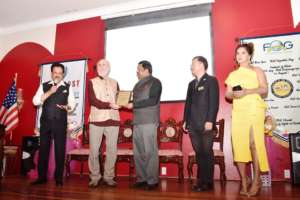 The disease in focus was rheumatoid arthritis. Dr Anupama opened the panel talk with a brief explanation of the pathology of autoimmune disorders, in which the body’s own immune cells start attacking it. She emphasized the importance of sleep hygiene, positive emotions, stress management and diet in the prevention of autoimmune disorders.
The disease in focus was rheumatoid arthritis. Dr Anupama opened the panel talk with a brief explanation of the pathology of autoimmune disorders, in which the body’s own immune cells start attacking it. She emphasized the importance of sleep hygiene, positive emotions, stress management and diet in the prevention of autoimmune disorders.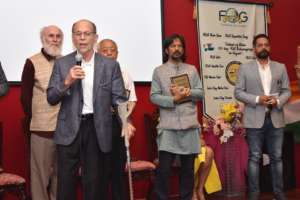
She explained the ayurvedic concept of “Ama”, undigested food that becomes a toxin in the body, and causes chronic issues.
Dr Sheena Sooraj first explained what rheumatoid arthritis was – a condition that affects the joints of the hands and feet and is extremely painful and difficult to manage. Most patients consult a doctor only when the symptoms become unbearable. She added that in Ayurveda, rheumatoid arthritis can be compared to a condition called “Amavata” and referred to the concept of “Ama” that Dr. Anupama had talked about.
Dr Sheena added that 98 per cent of the disorders in the human body is related to the formation of “Ama”. She explained that incompatible food combinations such as pairing yoghurt with fish or meat and sour fruit with milk as well as incompatible lifestyles could lead to the formation of “Ama”.
Dr Sheena also talked about the concept of “Ojas”, the “glow” that a person emanates, good health that results from the proper absorption of nutrients from food, and the nutritional essence of food that is formed during the breakdown of food as the first step in digestion.
Dr Anupama and Dr Sheena alternated during their engaging presentation.
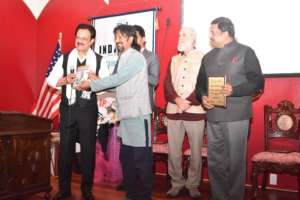 Dr Komal Anand gave a brief overview of homoeopathic medicine, its history and core philosophy. Homoeopathy originated in Germany in the 18th century, founded by Samuel Hahnemann. Its fundamental principle is “like cures like”, meaning that a disease can be cured by substances that cause symptoms similar to the diseases.
Dr Komal Anand gave a brief overview of homoeopathic medicine, its history and core philosophy. Homoeopathy originated in Germany in the 18th century, founded by Samuel Hahnemann. Its fundamental principle is “like cures like”, meaning that a disease can be cured by substances that cause symptoms similar to the diseases.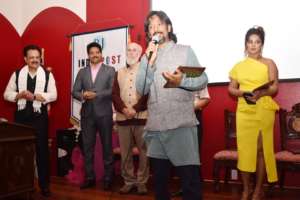
She gave the example of malaria, for which the drug quinine from the bark of the cinchona tree is used as a cure. Samuel Hahnemann found that the bark caused symptoms similar to that of malaria – fever and shivering – in non-malarial people.
Dr. Komal also gave a brief overview of the various categories of diseases that homoeopathy recognizes and the sources of its medicines. Unlike other forms of medicine such as naturopathy and Ayurveda, homoeopathy says that medicines derived from animal sources are far more potent. Medicines are derived from animals such as snakes and insects such as spiders.
She explained the terminology of homoeopathic medicine labelling – 1M, 10M, and so one – which refer to the concentrations of the medicines.
The last panel of the day was on Spine and Joint Health (Musculoskeletal Disorders). Co-Convener Dr Jayarajan Kodikannath was the panel moderator.
An illustrious and diverse range of experts formed this panel: Dr Le Roy Perry, renowned chiropractor, sports medicine specialist, founder of International Sportscience Institute in Los Angeles, inventor and doctor to the US Olympic team and other international athletes, Dr Gerred Popejoy, chiropractor and founder of Nordic Walking Nations, Dr Kamya Pillai, faculty member at Kerala Ayurveda Academy in Milpitas, California, and Raji Krishnamurthy, certified yoga therapist and ayurvedic wellness practitioner who runs her own consulting practice, RK Yoga and Ayurveda.
 The evening wrapped up with a session on Siddha, led by co-convener Dr Shan Lakshmanan. Siddha is an ancient form of healing that was propagated by sage Agastya in southern India. It is practised in Tamil Nadu and Kerala.
The evening wrapped up with a session on Siddha, led by co-convener Dr Shan Lakshmanan. Siddha is an ancient form of healing that was propagated by sage Agastya in southern India. It is practised in Tamil Nadu and Kerala.
The concepts of energy healing and “marma”, the mysterious science of various pressure points in the body related to key functions and illnesses, are very important in Siddha.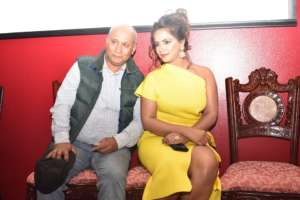
Dr Lakshmanan laid out a very important principle of Siddha – it is not just the doctor that has to be good, it is also the patient who must be good. It means that the patient must be open to treatment and compliant with the physician’s instructions.
He demonstrated pressure point healing with a subject suffering from chronic backache. She reportedly felt much better after the session.
Later that evening, a networking dinner was held at Dr. Japra’s place, Japra Vineyards. Many of the distinguished speakers were honored. Indian Consul General in San Francisco Sanjay Panda and Fremont Council member Yang Shao were among the dignitaries who were present at the event.

